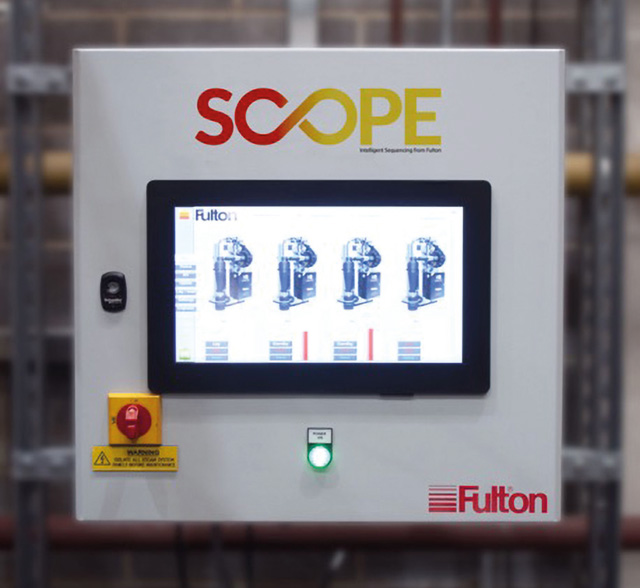Intelligent boiler sequencing control systems can optimise steam boiler installations, for energy efficient operation and improve boiler longevity. Carl Knight, managing director of process steam and heat transfer specialist Fulton, takes a look.

Many process plants operate multiple steam boilers to meet the demands of their on-site processing equipment. Some sites operate a number of boilers to provide reserve capacity or reliability, others because space considerations mean multiple boilers are the preferred solution to a single, much larger boiler. However, if the steam boilers in facilities with multiple units are not optimised for efficiency, then the potential for any energy savings is not being used to its fullest.
The use of intelligent sequencing systems can provide redundancy and reliability and also offer significant energy savings by automating start-up and shut-down procedures; controlling and optimising main steam header pressure or temperature; ensuring steam supply is controlled precisely for the required process; and balancing the load distribution among the boilers, thus eliminating extensive losses from repeated start/stop cycling of burners as much as is feasibly possible.
Sequencing should be about more than just simply on/off or start-up control. An intelligent sequencing system should also consider steam system load conditions and match this to the most efficient combination of boiler capacity according to the process requirements.
Load response and start-up times are also factors. For example, a boiler sequencing control system should be capable of knowing when running too many or too few boilers is having a negative effect on efficiency and productivity. It should be able to monitor and pre-emptively predict a sudden surge in demand and boiler utilisation by monitoring existing boiler demand, system pressures and flow rates, and therefore starting or stopping boilers appropriately depending on the process demands.
There are also factors including what happens in the case of boiler failure, sudden high steam loads and even lack of boiler availability due to servicing. A good sequencing system should take all these factors into consideration and then manage the boiler operation automatically. The result should be that the user doesn’t notice that a second or third boiler has had to be started because the machine they are working on has just started a stage with high steam demand during its production process.
Fulton’s recently-launched Scope – an all-new, PLC-based boiler sequencing control system – has been designed from the ground with all these factors considered and can optimise multiple steam boiler installations to ensure energy efficient operation and improve boiler longevity.
Additional benefits include better control of the main steam header pressure, leading to more consistent pressure and steam dryness fractions – vitally important factors for sterilisation processes and accurate heat transfer rates; precisely-controlled process steam or hot water supplies; boilers operating at main header pressure or temperature rather than maximum pressure or temperature; longer boiler life thanks to redundancy; and improved fuel savings through eliminating idle time at low fire.
But what about the future of boiler sequencing and the development of intelligent control systems using the Cloud and the IoT?
Many processing plants operate 24 hours a day so, to keep these facilities running consistently and efficiently, immediate action is often required or expected from the boiler manufacturer. By accessing its Scope intelligent sequencing system via Cloud-based systems, Fulton is already looking to incorporate remote accessibility for diagnostic and service-related issues, and providing remote data for system improvements, which can be accessed by specialist engineers for diagnostics and clients for data review.
Fulton is also looking at the ability to perform certain maintenance procedures or service steam boilers remotely, no matter where in the world they are installed. This would help to reduce the environmental impact and costs associated with travel to and from site, savings that can be passed on to the client.
The future will therefore offer simple sequencing control of multiple boiler installations or a full boilerhouse energy management system, accessible remotely by the manufacturer and client alike, to provide an efficient solution for everyone.
Further information: Carl Knight
0117 972 3322 | sales@fulton.co.uk | www.fulton.co.uk

